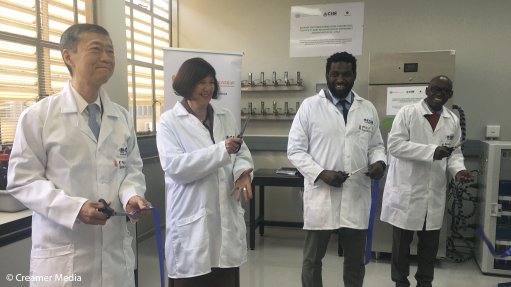
At the ribbon cutting ceremony are Japan Ambassador to South Africa Norio Maruyama; Forestry, Fisheries and the Environment Minister Barbara Creecy; Higher Education, Training, and Science and Technology Deputy Minister Buti Manamela; and CSIR CEO Thulani Dlamini.
Photo by: Creamer Media
The government of Japan, through the Japanese Embassy in South Africa, on August 23 handed over laboratory equipment to the Council for Scientific and Industrial Research’s (CSIR’s) Pretoria campus to help the organisation research the credibility of biodegradable plastics.
The laboratory equipment forms part of a three-year project funded by the government of Japan, and implemented through the United Nations Industrial Development Organisation (Unido), to combat the marine plastic litter issue in South Africa.
The culmination of the new laboratory follows a bilateral meeting between President Cyril Ramaphosa and then Japan PM Shinzo Abe, in June 2019.
During that meeting, Abe committed that Japan would make $1.8-million available to assist South Africa in addressing the leakage of plastic waste into the environment, especially the ocean.
The laboratory equipment includes a respirometer, an automated titration system and an elemental analyser.
This equipment will enable the CSIR, through its biodegradation facility, to test and verify biodegradation claims of alternative materials, including compostable plastics, as viable alternatives for problematic and long-lasting products.
Forestry, Fisheries and the Environment Minister Barbara Creecy on August 23 noted that regulations for organic waste treatment, as well as the composting of organic waste, were published earlier this year for implementation.
“This will help ensure that organic waste, including food waste, is diverted from landfills and used in composting and other sustainable technologies,” she said.
At present, Creecy said, although biodegradable plastics represented less than 1% of plastics produced yearly, rising demand and an increase in more sophisticated applications meant production capacity would increase going forward.
“Bioplastic alternatives exist for many current plastic products, and we expect consumer choice to drive their mainstreaming and increased uptake over time,” she added.
This development meant regulators were challenged to ensure that the certification systems for these products protected both consumers and the environment, stated Creecy.
In this regard, she pointed out that the Extended Producer Responsibility Regulations included a transitional timeframe, affording the industry time to prepare for the enforcement of environmental labelling obligations.
This means any packaging product that claims to be biodegradable needs to be certified as such, thereby reinforcing the need for the new biodegradation laboratory, which the Japanese government is working together with the CSIR on certifying with the South African National Accreditation System.
“The services that will be on offer through [the] donation will broaden transparency and ensure product claims can be tested in accordance with environmental labelling standards. At the same time, the South African Bureau of Standards is currently in the process of developing local standards for biodegradable packaging,” said Creecy.